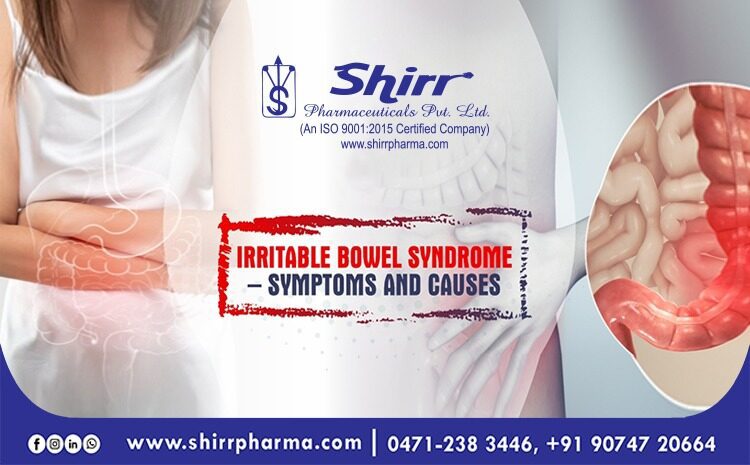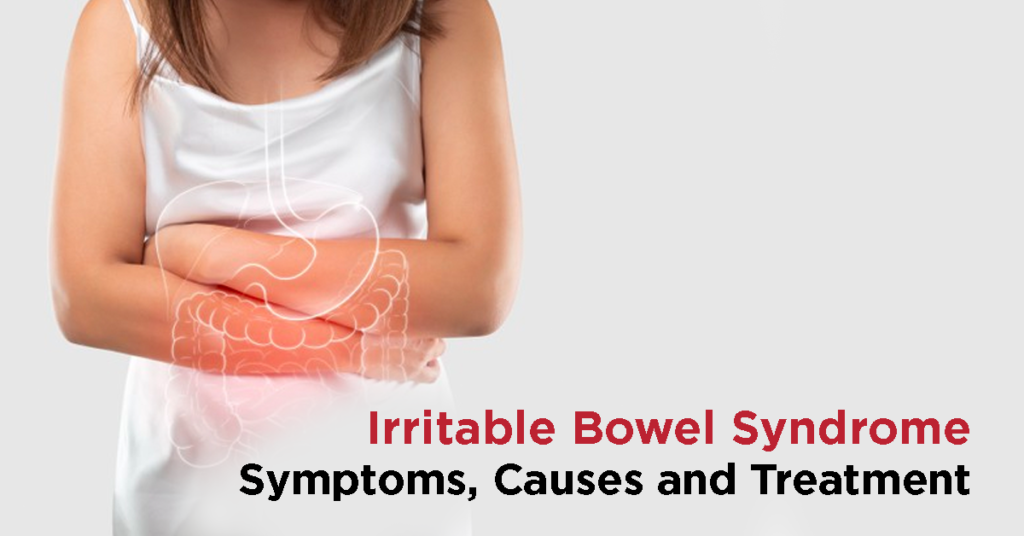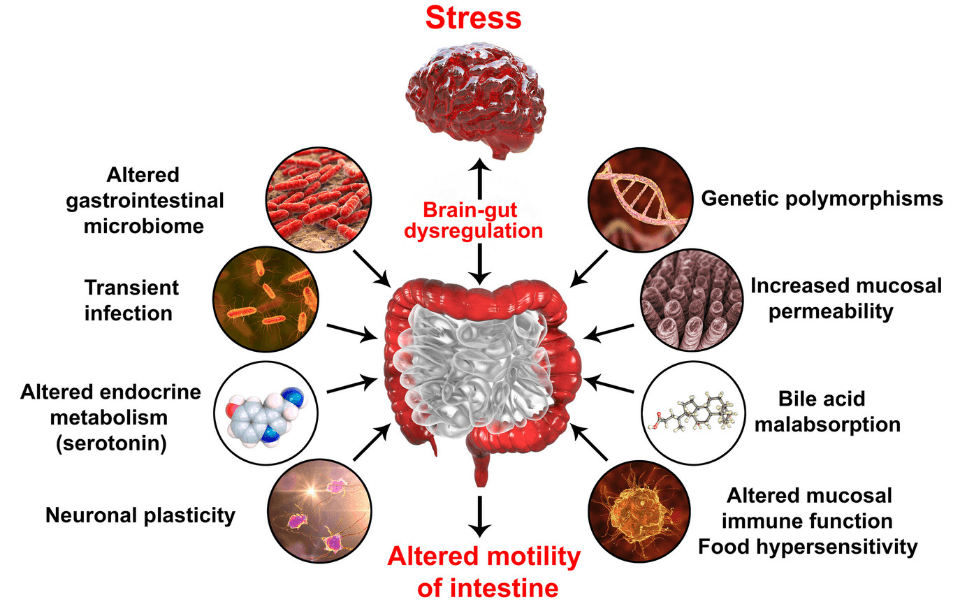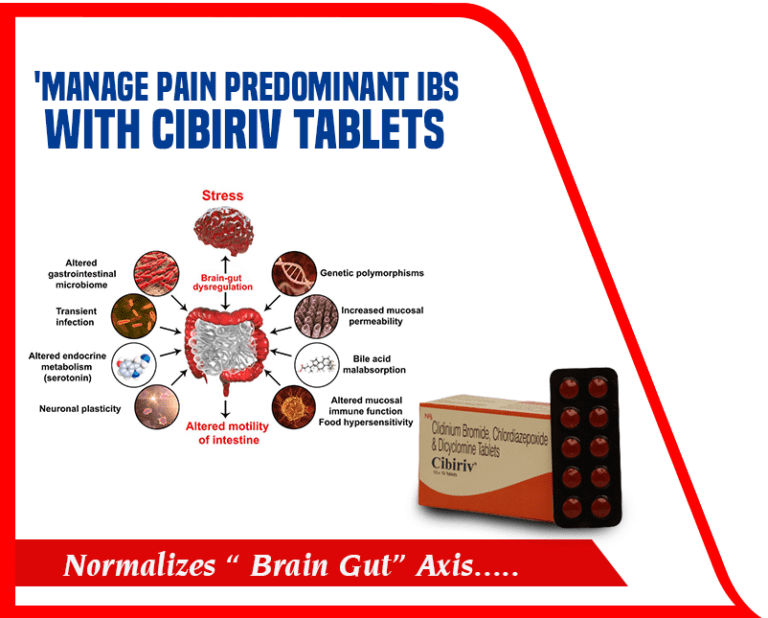
Irritable bowel syndrome is a
chronic
disorder of the bowel (gut) that
causes occurrences of abdominal cramps, bloating and discomfort with bowel
habits i.e., either going more (diarrhoea) or less (constipation) often than
normal, also, there might be a feeling of incomplete
evacuation (a suspicion that the bowel is not fully emptied, post defecation).
Irritable bowel syndrome is a functional gastrointestinal (GI) disorder i.e., even though the gut looks normal, the functions of the digestive tract isn’t the same. These conditions are also called as the disorders of the brain-gut interaction and have to do with problems in their comprehensive working.
Click on the image for more information on Cibiriv Tablets 🠮
Normally, because of the systemic contraction and relaxation of the muscles in gut, the movement of food from stomach to the rectum takes place in a fairly consistent schedule. However, in some people, the muscles spasm i.e., the contractions are longer, stronger than usual and are painful, disrupting the intestinal movement of the food. Depending upon the pace of the flow, either slower or faster than normal, one becomes constipated or gets diarrhoea. It is not unusual for people with IBS to alternate between both episodes.
Also, motility of the
digestive tracts is controlled to a great extent by the nervous system,
therefore, factors contributing to Stress and Anxiety may hamper coordinated
communication signals between the brain and the gut causing the bowel to
overreact to changes that normally occur in the digestive process resulting in
pain and discomfort.
IBS is categorised in four sub-types mainly
- IBS with constipation (IBS-C)
- IBS with diarrhoea (IBS-D)
- Mixed IBS (IBS-M) alternates between
constipation and diarrhoea
- Unsub typed IBS (IBS-U) for people who don’t
fit into the above types
Syptoms Causes and Treatment of Irritable Bowel System (IBS)

CAUSES AND SYMPTOMS
It is still unclear as to what exactly causes irritable bowel syndrome (IBS), however, researches have figured in a combination of factors leading to IBS, including and not limited to
- Intestinal Dysmotility: Un-systemic contraction of the muscles in gut causing muscle spasms and disrupting the otherwise rhythmic flow of food, leading to gas, bloating, diarrhoea or constipation.
- Brain-gut dysfunction: Poorly coordinated communication signals between the brain and the gut causing the bowel to overreact to changes that normally occur in the digestive process resulting in visceral hypersensitivity.
- The brain and gastrointestinal tract are intimately connected, therefore, sensitive to emotions. Feelings of anxiety, depression, sorrow, elation, anger etc can trigger response in the gut. Therefore, gut’s distress can be an ad-hoc reaction to emotional imbalance.

- Post a bout of severe infection such as gastroenteritis or traumatic stress, can trigger post-infectious IBS (PI-IBS) & post-traumatic stress disorder (PTSD).
- Gut microbes such as bacteria, fungi etc residing in the intestines and play a key role in maintaining GI functions, symbiotic imbalance in the same can onset the development of IBS.
The symptoms of IBS vary from person to person. The signs and symptoms of IBS vary but are usually present for a long time. The most common include:
In IBS, symptoms vary from person to person, however, the most common include and not limited to
- Abdominal spasm and discomfort
- Abdominal bloating or swelling
- Mucous while passing stools.
- Changes in bowel movement and appearance.
- Feeling that the bowels are not emptying after passing stools and sometimes an urgency to use the washrooms frequently.
- PREVENTION ADVICE & TREATMENT
The treatment for IBS is primarily focused at symptom relief and to improve quality of life, as there is no permanent cure for the same. Initially, doctors may advice to make certain lifestyle and dietary changes as well as learning how to manage stress, before starting medication. Some of the remedies include
- Increase fibre intake by eating vegetables, fruits, whole grains and nuts.
- Chart a regular meal pattern, chew the food well and avoid eating late night.
· Drink plenty of water, at least 8 to 10 glasses per day.
- Engage in regular exercise and physical activities.
- Start intake of probiotics supplement (“good” bacteria normally found in the intestines).
In cases where lifestyle changes alone fail to yield the desired result, following prescription medication may be initiated by the doctor, post medical assessment and not limited to
- Antispasmodic medication relaxes the muscles in the wall of the gut.
- Laxatives to relieve constipation.
- Antimotility medications to manage diarrhoea by slowing intestinal contractions of the muscles.
- Tricyclic antidepressants (TCAs) to reduce abdominal spasm.




